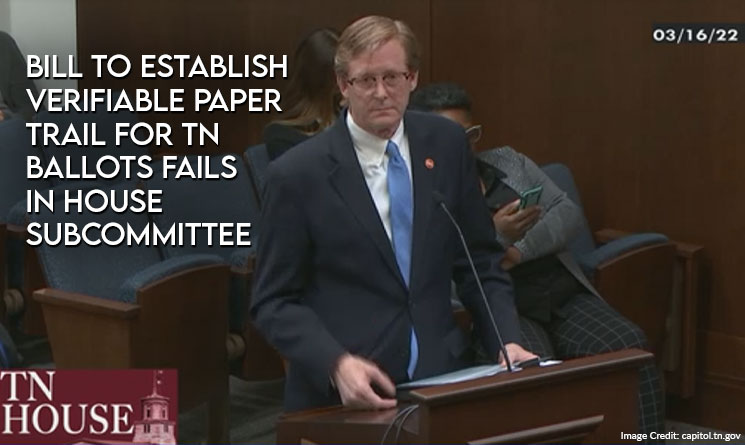***Update 3/24/22 – The Special Calendar hearing of HB2074 was rolled to 3.30.22. The Senate version was scheduled to be heard yesterday by the Senate State and Local Government Committee but no video or updates are available on the General Assembly website at time of publication.
Image Credit: capitol.tn.gov
The Tennessee Conservative [By Jason Vaughn] –
A bill aimed at reestablishing trust in Tennessee Elections was debated in the House Elections and Campaign Finance Subcommittee on March 16th and failed in a 7-0 vote due to concerns about perceived implementation costs.
House Bill 2074 (HB2074) sponsored by Representative Bruce Griffey (R-Paris-District 75), as introduced, required county election commissions to use only ballot-marking devices or hand-marked ballots and tabulate the ballots using an electronic tabulator or by a hand count; specified the distance from which a poll watcher may observe the counting and processing of ballots; required certain security features on paper ballots.
Prior to presenting the bill to the Subcommittee, Representative Griffey requested a roll-call vote so that the names of those who might vote against would be noted on the official record.
Griffey then outlined the features of the bill:
- – The legislation applies to the 2024 elections and all elections thereafter
- – Beginning with the 2024 election cycle and notwithstanding another law to the contrary, each county election commission shall use ballot-marking devices or handmarked ballots and tabulate the votes using an electronic tabulator or by a hand count.
- If a county election commission cannot acquire the necessary equipment to implement this section before the 2024 elections, the county election commission may request the secretary of state for an extension to 2026 for compliance.
- This state shall share in at least fifty percent (50%) of the cost of a county election commission complying with this section, subject to appropriations.
- A poll watcher shall not be prevented from observing and documenting the counting and processing of ballots from a normal unaided visual length of sight, which is a distance of three (3) feet or less.
- The coordinator of elections shall prescribe security features that must be used on paper ballots. The security features may include watermarks, fluorescence, digital holograms, or a unique ballot identifier that ensures no ballot can be duplicated or counted more than once. The coordinator of elections may change the ballot security features from election to election. It is the intent of the general assembly that the coordinator of elections use all reasonable security features to ensure the security of the election.
At the time of yesterday’s hearing, a somewhat similar bill (HB2331), sponsored by Representative Rush Bricken (R-Tullahoma-District 47), had already passed the Elections and Campaign Finance Subcommittee. However, Bricken’s bill, most notably, does not add the unique ballot identifiers section or the poll watcher section as outlined in Griffey’s HB2074.
Regarding Griffey’s bill, Representative Ryan Williams (R-Cookeville-District 42 ) raised concerns over the possibility of increased complexity of ballot tabulators, followed by Representative Dave Wright (R-Corryton-District 19), who was the first to raise concerns over increased costs when compared to Bricken’s bill.
Dennis Holtz, a resident of Dickson County, offered testimony in support of Griffey’s bill stating, “It’s cheaper to use an optical scanner than to use these big complicated machines….The public, right now, does not trust the election process. This is a very simple bill that speaks volumes about moving ahead with a secure means of protecting each individual vote.”
Mark Goins, Coordinator of Elections for Tennessee, also offered testimony but spoke against the bill, first stating there had been no federal or state-level litigation filed to challenge the 2020 elections in the state of Tennessee.
Representative John B. Holsclaw (R-Elizabethton-District 4) asked Goins if the HB2074 would make Tennessee elections more secure. Goins answered, “It would make them more complicated…” and stated that some voters would be concerned about unique identifiers being on the ballots implying there might be privacy concerns.
Goins also stated that Griffey’s bill would cost more to implement than Bricken’s bill since it would require all-new equipment. With Bricken’s bill, some of the existing voting machines could be modified to produce a paper-copy of each vote cast. To summarize, Goins implied that the merits of Griffey’s bill versus Bricken’s did not qualify the additional cost.
*** Click Here to Support Conservative Journalism in Tennessee. We can’t cover stories like this without your support! ***
Griffey, when defending his legislation, stated that his bill would not outlaw microvote completely but would outlaw the current DRE (Direct Recording Electronic) voting machines which Griffey said are “the problem we have in Tennessee and that’s the problem I’m trying to address with this legislation.”
Griffey said, “If someone had hacked one of the DRE’s in a previous election, we can’t prove that now, there’s no way to go back and prove that. We need to get away from that so that we have some kind of paper audit trail so we can go back and verify that the machine is actually counting the way that people have marked on the ballot.”
Regarding the cost, Griffey said, “It’s my understanding that the Coordinator of Elections already has a significant amount of money to try to assist locals in the purchase of new equipment.”
Representative John Crawford (R-Bristol/Kingsport-District 1) stated that all counties would not be “made whole” on the purchase of new equipment if they had already bought new equipment this year. “It’s going to cost my county over $400,000,” he said.
Griffey replied that his bill says the implementation is “subject to appropriations” which means if the money isn’t there, the counties cannot be forced to comply. “It is my intent not to do unfunded mandates,” he said.
With Griffey’s bill, the state must fund 50% of the cost of changes which is mostly, if not completely, covered by grants from the Federal government.
Williams said, “Under your bill, my community would have to buy all-new machines. Under the previous bill that came through here, those machines could be modified.” Citing the perceived cost differential in adopting Griffey’s bill, Williams said, “I don’t know how it’s even tenable for us to do that.”
Griffey said in response, “It’s my understanding that there is money to help your county purchase new machines. And under my bill, it’s my position that that same money would be used to purchase new machines that would comply with this law. I don’t think this law is materially different as far as the ballot marking devices and paper ballot trail requirement in Representative Bricken’s bill.”
With no more questions or comments, Representative Crawford, who was filling in as Chair for Representative Tim Rudd (who had to leave the meeting to present a bill) called for a vote.
Griffey’s bill failed with 7 votes against and 0 in favor. 5 of the No votes came from Republicans and the remaining two came from Democrats.
Crawford stated the bill failed and would be moved to Special Calendar.
Prior to having to leave the meeting, in a statement unrelated to Griffey’s bill, Committee Chairman Tim Rudd explained that if a bill is voted out of Committee, it automatically goes to Special Calendar to be heard at the end of Session or to be reconsidered.
If you would like to contact the Republican members of the subcommittee and ask why they voted No, you can find their contact information below. Note: Chairman Tim Rudd’s name has been left off the list as he was not present at the time of voting.
House Elections and Campaign Finance Subcommittee
John Crawford – rep.john.crawford@capitol.tn.gov – (615) 741-7623
John B. Holsclaw, Jr. – rep.john.holsclaw@capitol.tn.gov – (615) 741-7450
Eddie Mannis – rep.eddie.mannis@capitol.tn.gov – (615) 741-2287
Ryan Williams – rep.ryan.williams@capitol.tn.gov – (615) 741-1875
Dave Wright – rep.dave.wright@capitol.tn.gov – (615) 741-6879
The Senate version of Griffey’s bill (SB2359), sponsored by Senator Janice Bowling (R-Tullahoma-District 16) is scheduled to be heard by the Senate State and Local Government Committee on March 22nd.
The contact information for the Republican members of the Committee can be found below.
Senate State and Local Government Committee
Richard Briggs (Chair) – sen.richard.briggs@capitol.tn.gov – (615) 741-1766
Todd Gardenhire (1st Vice-Chair) – sen.todd.gardenhire@capitol.tn.gov – (615) 741-6682
Page Walley (2nd Vice-Chair) – sen.page-walley@capitol.tn.gov – (615) 741-2368
Ed Jackson – sen.ed.jackson@capitol.tn.gov – (615) 741-1810
Brian Kelsey – sen.brian.kelsey@capitol.tn.gov – (615) 741-3036
Bill Powers – sen.bill.powers@capitol.tn.gov – (615) 741-2374
Ken Yager – sen.ken.yager@capitol.tn.gov – (615) 741-1449

About the Author: Jason Vaughn, Media Coordinator for The Tennessee Conservative ~ Jason previously worked for a legacy publishing company based in Crossville, TN in a variety of roles through his career. Most recently, he served as Deputy Director for their flagship publication. Prior, he was a freelance journalist writing articles that appeared in the Herald Citizen, the Crossville Chronicle and The Oracle among others. He graduated from Tennessee Technological University with a Bachelor’s in English-Journalism, with minors in Broadcast Journalism and History. Contact Jason at news@TennesseeConservativeNews.com






4 Responses
We need to protect our voting. We have seen corruption in the system we have now. We need to protect our liberty by being sure that our elections are honest.
It’s a sad fact we do not want to spend a few dollars to insure the fairness of our elections but we will spend millions on giving public assistance to Illegal aliens. Somethin is not right here!!!!
Especially considering the surplus of funds our State took in for the fiscal year and reported having!!! Spend some of that money securing our elections!!!
The first bill that was passed sounds like it will accomplish the objectives.
The Griffy bill is good, but costs are always at issue. Also, the people that oversee our voting process are average citizens. There’s no reason to complicate the matter any more than necessary.